Navigating the world of personal finance apps can be tricky, especially if you're after something primarily investment-focused. We've zeroed in on apps that enhance the portfolios of everyday investors—minus the clutter of comprehensive budget trackers, niche crypto tools, and “All-In-One” Personal Finance Apps. If you’re looking for our recommendations for the best All-In-One Banking + Investment apps, check out our review here.
Our goal for this post? To identify standout apps that are user-friendly and poised to maximize your returns. Whether you're making your first investment or optimizing an existing portfolio, these tools are (mostly) built to be the bedrock of your financial endeavors and are meant to be paired with your banking provider.
This isn't about reckless spending or chasing trends. It's about smart, strategic growth. We've put each app through its paces, ensuring they offer more than just the basics. Expect real-time data, tailored insights, and features that empower you to take control of your financial future. Get ready as we reveal the top investment apps that earn your trust and boost your bottom line.
What we look for
- Purpose, Features, and Functionality: Auto investing, crypto exposure, etc.
- User Interface and Ease of Use: Importance of a user-friendly design
- Cost: Free vs. paid features, subscription models
- Customer Support: Availability and quality of support services
- User Reviews and Ratings: Summary of user feedback from various platforms
Everything we recommend
| Company | Best For | Apple App Store | Google Play Store |
|---|---|---|---|
| Robinhood | Best user experience and low-cost | 4.2 (4.3M) | 4.1 (487k) |
| M1 Finance | Best overall for most people | 4.7 (70k) | 4.4 (25k) |
| Public | Best for social investing | 4.7 (70k) | 4.1 (47k) |
| eToro | Runner-up for social investing | 4.2 (6k) | 3.9 (10M) |
| Charles Schwab | Best for intermediate and advanced users | 4.8 (850k) | 2.3 (26k) |
| E*TRADE | Runner-up for intermediate and advanced users | 4.6 (162k) | 4.4 (44k) |
| Masterworks | Best for alternative investments | 4.8 (2k) | 4.5 (1k) |
Robinhood Review
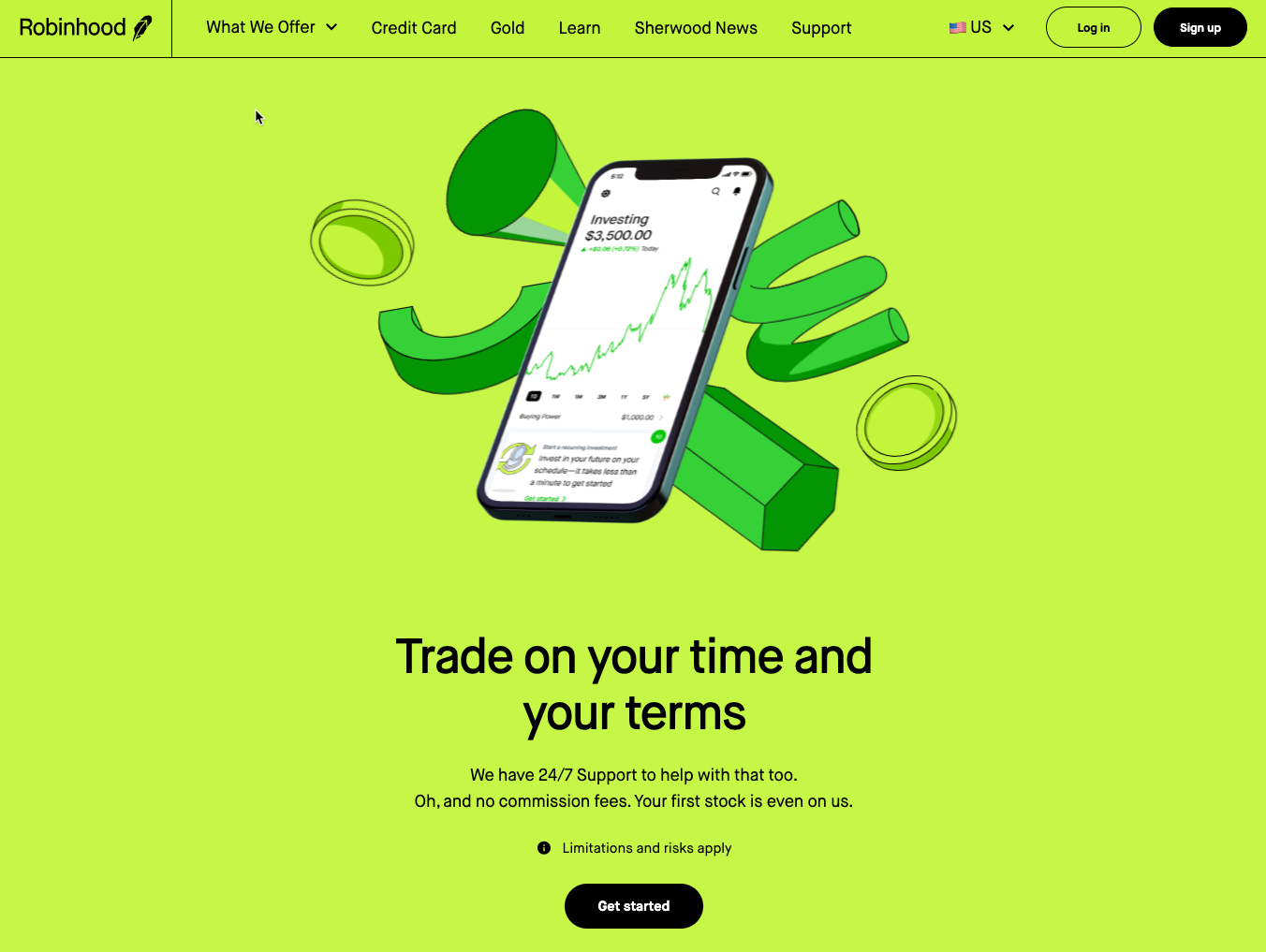
Robinhood is the original mobile app that popularized free stock trading in 2013. They seek to democratize stock trading by enabling anyone to access commission-free trading across stocks, ETFs, options, and cryptocurrencies. It appeals to beginner and intermediate customers with a simple interface, no fees, and a “choose your own” adventure philosophy. Ideal for millennials and tech enthusiasts seeking an efficient investment route, Robinhood offers accessibility and financial empowerment. Expanding into cryptocurrencies has made trading in major digital currencies like Bitcoin and Ethereum more accessible. Robinhood Gold, their premium service, offers advanced features like research reports, margin trading, and instant deposit access for experienced traders seeking to elevate their investment strategy.
However, Robinhood also has a downside. Over 70% of Robinhood customers tend to lose money, as the platform doesn’t position its services to prevent consumers from making bad investment decisions. Additionally, it’s been criticized for selling its customer's data and halting trades during times of volatility—like during the GameStop controversy.
Pricing: $0-$9/month + various fees
Pros:
- Commission-Free Trades: One of Robinhood's biggest draws is its offer of commission-free trades on stocks, ETFs, options, and cryptocurrencies. This makes it accessible for users to trade without worrying about high transaction costs.
- User-Friendly Interface: The platform is designed with beginners in mind, featuring a straightforward, intuitive interface that simplifies the trading process and makes it less intimidating for new investors.
- No Minimum Deposit: Robinhood does not require a minimum deposit to start trading, which lowers the barrier for entry for those new to investing or with limited capital.
- Robinhood Gold: For a monthly fee, Robinhood Gold offers users additional features like professional research reports, Level II market data, margin trading, and a competitive cashback credit card.
- Mobile App: The Robinhood app is highly rated and allows users to trade and manage their investments conveniently from anywhere.
Cons:
- Lack of Guardrails and High Risk: Because of Robinhoods "open access" approach to investments, they essentially allow anyone to do anything. This results in the majority of Robinhood users losing money. Sources report over 70% of users lose money on Robinhood over time. Compared to other platforms and robo-advisors, this is shockingly high.
- Limited Investment Products: Compared to more traditional brokerages, Robinhood offers a more limited selection of investment products. For example, mutual funds and bonds are not available on the platform.
- Customer Service: Robinhood has faced criticism for its customer service, which has been challenging for some users to navigate, especially in urgent situations. The platform primarily relies on email support, which may not meet everyone's needs.
- Oversimplification of Trading: While the simplicity of the Robinhood platform is appealing to beginners, it may also oversimplify the trading and investment process, potentially leading users to underestimate the risks involved.
- Regulatory and Technical Issues: Robinhood has faced various regulatory challenges and technical outages, raising concerns about its reliability and the security of user investments.
- Limited Educational Resources: Compared to other platforms that offer extensive educational materials and tools, Robinhood's resources for learning about investing and trading are relatively limited, which might not suffice for those looking to deepen their understanding of the markets.
Conclusion, Robinhood:
Robinhood is well-suited for novice investors attracted to an easy entry point into investing and trading. Its commission-free model and user-friendly design make it a compelling choice for those looking to start investing without the burden of high fees or complex platforms. However, the limitations in customer service, product selection, educational resources, and concerns over platform stability mean that more experienced investors or those seeking a comprehensive investment platform might look elsewhere to meet their needs.
M1 Finance Review
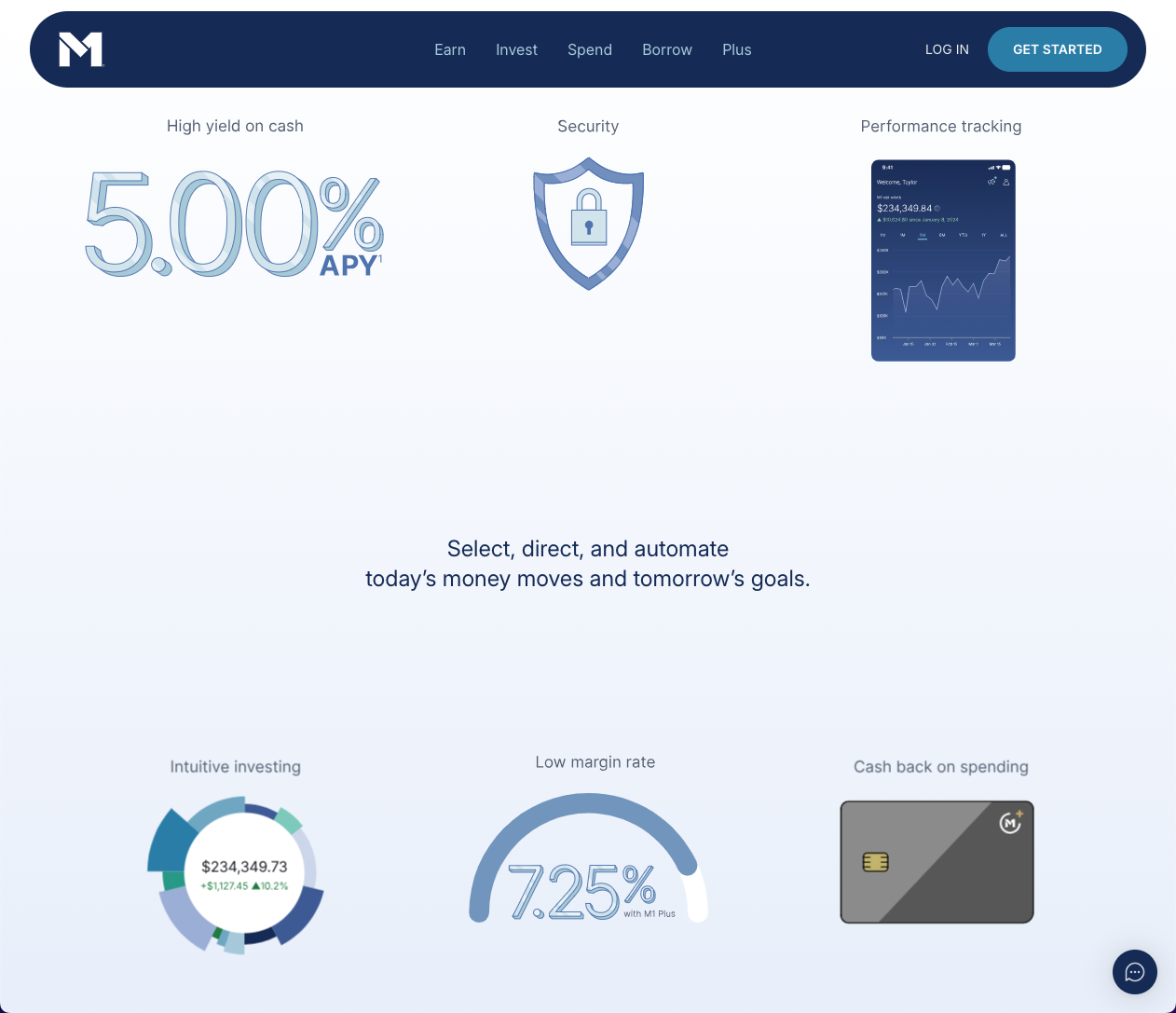
M1 Finance combines robo-advisor efficiency with the customization of traditional brokerage services, allowing investors to create personalized "Pies" of stocks and ETFs or select from pre-made options. Its automation features, such as automatic rebalancing and dividend reinvestment, streamline investing without commission or management fees. Suited for investors who desire both control and convenience, M1 offers a novel approach to portfolio management and wealth growth, catering to both active and passive investors with its flexible, cost-effective platform.
Pricing:
- $0/month for essential services
- $3/month for premium
Pros:
- Customization and Automation: M1 Finance allows investors to build customized portfolios of stocks and ETFs, offering a level of control similar to a traditional brokerage but with the automation of rebalancing akin to a robo-advisor. This feature is particularly appealing to investors who want a hands-on approach without the need to manually manage their investments daily.
- No Trading Fees: M1 Finance offers commission-free trades, making it cost-effective for investors to build and maintain their portfolios. This is especially beneficial for those who regularly adjust their portfolio or invest in small increments.
- Fractional Shares: The platform supports fractional share investing, enabling users to buy a piece of a stock or ETF regardless of the share price. This feature is ideal for investors with smaller account balances or those looking to distribute their investments across many assets without being constrained by high share prices.
- M1 Borrow: M1 Finance offers users an integrated low-cost line of credit (M1 Borrow) with a minimum account balance. Customers can borrow up to 50% of their portfolio value for a competitive fee.
- Automated Rebalancing: The platform automatically rebalances your portfolio as you invest more money, ensuring that your allocations stay aligned with your target without manual intervention.
Cons:
- Limited Trading Windows: M1 Finance executes trades once or twice daily during set trading windows. This can be a drawback for investors looking for real-time trading capabilities or those who wish to take advantage of short-term market movements.
- Not Suitable for Active Trading: Given its structure and trading windows, M1 is not designed for active traders or those interested in day trading. The platform best suits long-term investors focused on portfolio growth over time.
- No Tax-Loss Harvesting: Unlike other robo-advisors, M1 Finance does not offer tax-loss harvesting, which can help reduce tax liabilities on investment gains. Investors must manage this aspect of their portfolio independently.
- Limited Research Tools: While M1 Finance offers some research tools and data, its offerings are less comprehensive than those on more traditional trading platforms. Investors looking for in-depth analysis or research may need to supplement with external resources.
- Minimum Balance for Certain Features: Some features, such as M1 Borrow, require a minimum account balance to access, which may not be feasible for all investors, particularly those just starting.
Conclusion, M1 Finance:
M1 Finance is a compelling choice for investors who prefer a hands-off yet personalized investment strategy. It combines the customization of individual stock selection with the ease of automated portfolio management. Its innovative approach to investing makes it particularly appealing to long-term investors and those interested in building diversified portfolios without the hassle of manual rebalancing. However, its limitations in trading flexibility and research tools may steer active traders and those requiring advanced analytics toward more traditional platforms.
Public.com Review
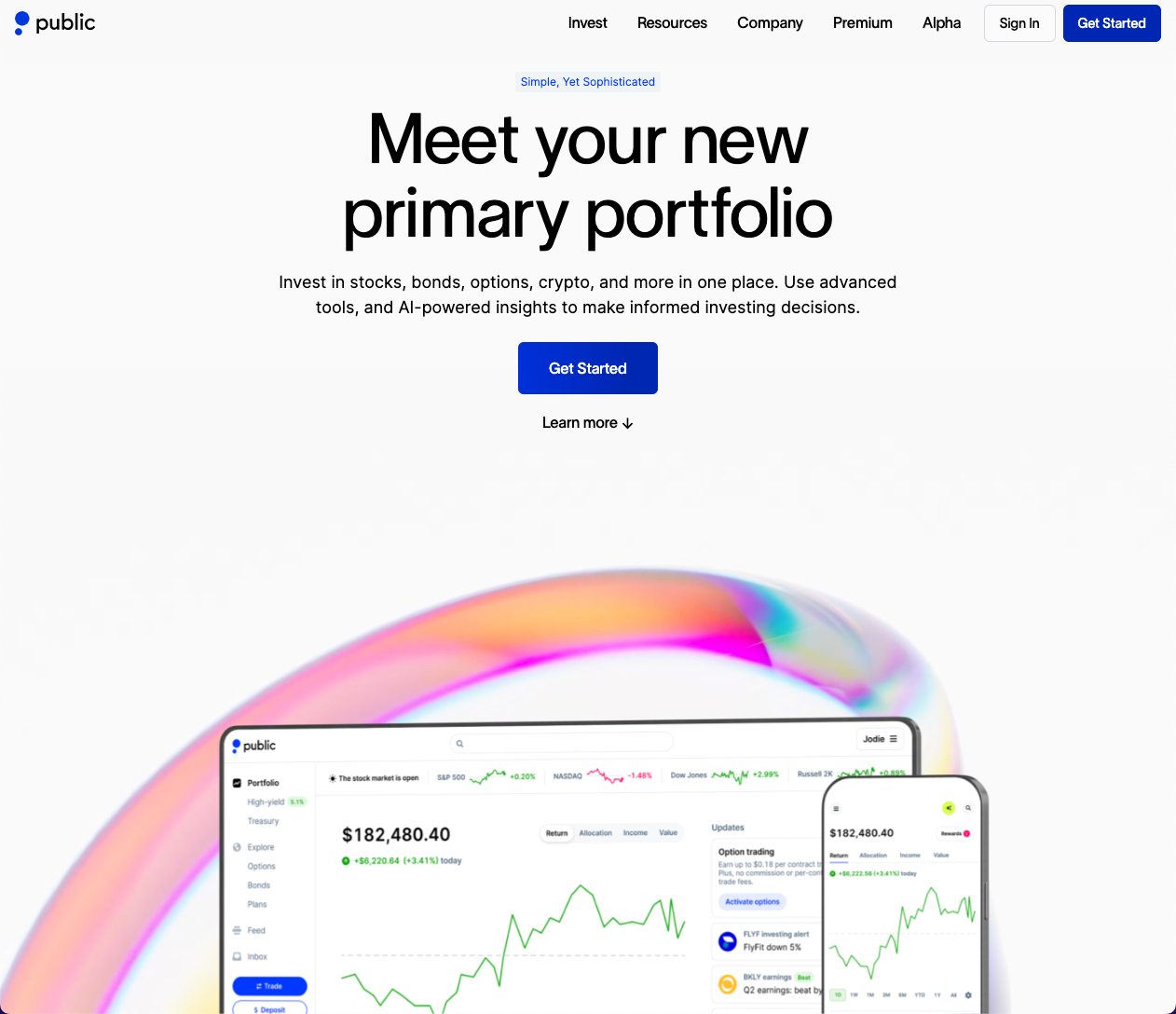
Public.com merges investing with a series of community features, enabling users to invest any amount while sharing insights and learning from a social network of investors. This approach makes finance more approachable and engaging - kind of like a social network mixed with personal finance. The app offers commission-free trading across stocks, ETFs, and crypto, focusing on transparency and education, highlighted by features like "Town Hall" for direct communication between companies and investors and themed collections for investment choices. Designed with intuitiveness and social integration, Public.com is ideal for investment newcomers or those seeking a transparent, community-focused experience. It appeals to a generation that values open dialogue, making investing an inclusive journey of shared knowledge and wealth growth.
Pricing:
- $0/month for essential services
- $8/month for premium
Pros:
- Social Investing Experience: Public.com stands out for its social network-like features, where users can follow other investors, share their portfolios, and exchange ideas. This can make investing more engaging and informative, particularly for beginners.
- Fractional Shares: The ability to purchase fractional shares allows investors with limited funds to participate in the stock market and invest in high-priced stocks they might not otherwise afford.
- Commission-Free Trades: Public.com offers commission-free trading on stocks and ETFs, making it a cost-effective option for investors looking to minimize fees.
- Educational Resources: The platform provides a wealth of educational content designed to help users learn about investing, financial literacy, and market trends, which is particularly beneficial for novice investors.
- Transparency: Public.com has committed to transparency, particularly regarding its move away from payment for order flow (PFOF), a common but controversial practice in the brokerage industry. Instead, it has introduced an optional tipping feature for users who want to support the platform.
Cons:
- Limited Investment Options: Compared to traditional brokerages, Public.com offers a more limited selection of investment products. While stocks and ETFs are available, options, bonds, and mutual funds are not, which may limit diversification opportunities for some investors.
- No Advanced Trading Tools: The platform's focus on accessibility and social features means it lacks the advanced trading tools and analytical resources that more experienced investors might seek.
- Potential Overemphasis on Social Features: While the social aspect of Public.com can provide valuable insights, it might also lead to herd mentality or influence investment decisions in ways that aren't always financially prudent.
- Limited Retirement Accounts: As of my last update, Public.com primarily focuses on taxable accounts and does not offer dedicated retirement accounts like IRAs, which could be a drawback for investors planning long-term financial goals.
- New Platform: Being relatively new in the investment world, Public.com doesn't have the long track record of some of its competitors, which might concern more cautious investors.
Conclusion, Public Finance:
Public.com is well-suited for beginner investors attracted to a community-oriented platform where they can learn from others and invest small amounts of money without hefty fees. Its educational resources and social investing features offer a unique approach that can demystify the investing process. However, the lack of advanced tools, limited investment options, and the potential for social influence to impact investment decisions might make it less appealing for experienced investors or those looking for a comprehensive investment platform.
eToro Review
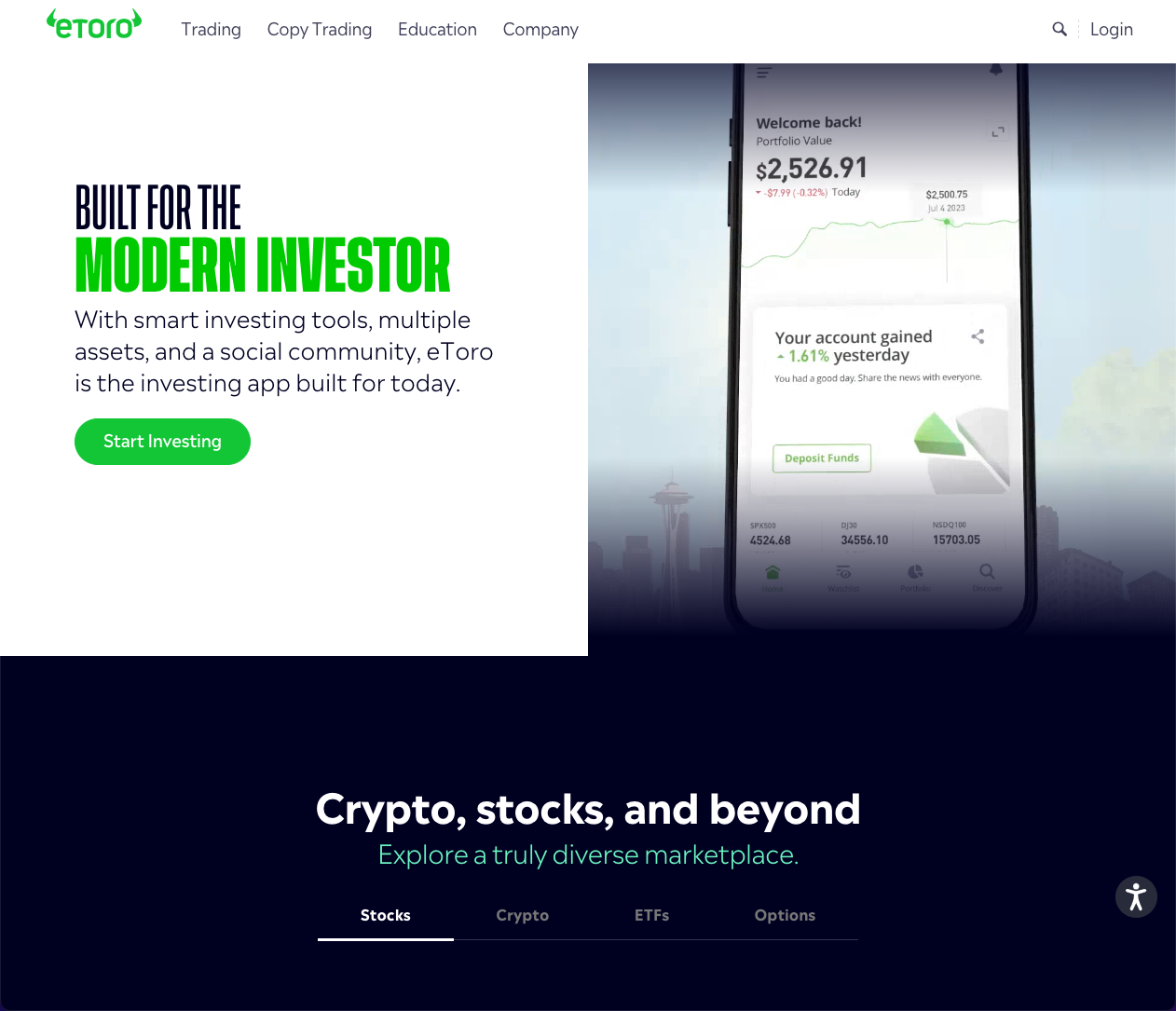
eToro has carved out a niche in the crowded fintech landscape by merging social networking with investment trading. Founded in 2007, this platform allows users to trade a variety of financial instruments, from stocks and commodities to currencies and ETFs. But eToro's standout feature is its social trading component, which enables users to copy the trades of experienced investors, effectively democratizing investment strategies that might otherwise be out of reach for casual traders.
This integration of social interaction with trading is not just a gimmick; it's a core part of the eToro experience, fostering a community where users can engage, learn, and emulate the moves of seasoned professionals. For those looking to dip their toes into the investment waters without going it alone, or seasoned investors seeking to leverage collective wisdom, eToro offers a compelling platform that's both innovative and approachable.
Pricing:
- 0% fee to buy and sell stocks and ETFs
- 1% fee for buying and selling crypto
Pros:
- Social Trading Network: One of eToro’s most distinguished features is its social trading network that allows users to follow and copy the trades of expert traders. This is especially beneficial for novice traders who can learn from and mimic successful strategies.
- Diverse Trading Instruments: eToro provides access to a wide range of financial instruments including stocks, forex, commodities, ETFs, and indices. This allows users to diversify their investment portfolio all from one platform.
- User-Friendly Interface: The platform is known for its intuitive and friendly user interface, making it accessible even to those who are new to trading.
- Regulated Platform: eToro is regulated by several financial authorities, including the Cyprus Securities Exchange Commission (CySEC), the Financial Conduct Authority (FCA) in the UK, and others, providing a level of security and trust.
- Demo Account: They offer a risk-free demo account loaded with virtual money, which is ideal for beginners to practice trading without financial risk.
Cons:
- Withdrawal Fees and Spreads: eToro charges withdrawal fees and their spreads can be relatively high compared to other brokers, which might reduce profitability for frequent traders.
- Limited Leverage for Certain Regions: Due to regulatory restrictions, leverage on various products is limited for users from certain regions, which may limit trading strategies.
- Customer Support: Some users report slow response times from customer support, which can be a significant drawback, especially in fast-moving market conditions.
- USD Only Accounts: All accounts are denominated in USD, which means that deposits and withdrawals in other currencies are subject to conversion fees.
- Limited Advanced Technical Tools: While great for beginners and intermediate users, eToro might not satisfy advanced traders who require complex technical charting tools and indicators.
Conclusion, eToro
Overall, eToro is best suited for investors who value social trading and are looking for a straightforward, interactive platform to manage a diversified investment portfolio. However, it might not be the best fit for highly active traders or those who depend heavily on technical analysis tools for their trading decisions.
Charles Schwab Review

Charles Schwab is one of the old-school incumbents in the financial services sector with its discount brokerage services, catering to investors of all levels. Which makes sense, consider it was founded in 1975. They offer everything from brokerage accounts and retirement planning to various investments like stocks, bonds, ETFs, etc. Its platforms, Schwab.com and StreetSmart Edge provide advanced trading tools and $0 commission fees on stocks and ETFs, enhancing trading decisions with features like real-time quotes and market analysis. For a hands-off approach, Schwab Intelligent Portfolios offers a robo-advisory service, managing ETF portfolios tailored to individual goals without advisory or account fees. Schwab also prioritizes investor education, offering a wealth of resources and top-notch customer service to guide clients. With a blend of affordability, powerful tools, and comprehensive support, Charles Schwab is a top choice for managing investments and financial learning. And you can bet your ass that they’ll be around in 30 years when it’s finally time for you to retire.
Something we’ve noticed is that consumers typically start using a newer platform for a few years, like Robinhood, M1, or one of the “All-In-One” apps, then move their portfolio to Charles Schwab, once they get the hang of things and want to optimize for lower fees and get acced to more advanced tools and white glove customer service.
Pricing:
- $0 for basic features + various fees for specialty services
Pros:
- Wide Range of Services: Charles Schwab provides a comprehensive suite of investment services, including stocks, bonds, mutual funds, ETFs, and retirement accounts, making it a one-stop shop for investors.
- No Account Minimums and Low Fees: Schwab offers competitive pricing with no account minimums for most accounts and zero commissions on stocks and ETF trades, lowering the barrier for entry for new investors.
- Robust Research Tools and Resources: Schwab is known for its extensive research offerings and sophisticated trading platforms, catering to beginners and experienced investors. These tools can help users make informed investment decisions.
- Excellent Customer Service: Schwab has a reputation for providing high-quality customer service. 24/7 support is available via phone, email, or live chat, as well as in-person consultations at physical branches.
- Access to Financial Advice: Schwab offers financial advisors and robo-advisor services for those seeking guidance, giving clients various options to fit their investment style and needs.
Cons:
- Complexity for Beginners: While Schwab's broad array of tools and services is a strength, it can also be overwhelming for beginners who might find the platform more complex than straightforward, streamlined alternatives.
- Fee Structure for Certain Services: While many of Schwab's services are low-cost or free, certain accounts and services may charge fees or require a minimum balance, which could be a drawback for some investors.
- Overwhelming Choice of Options: The sheer volume of investment options and the depth of research available, while beneficial to experienced investors, may be daunting for newcomers who are still learning the basics of investing.
- International Trading Limitations: While Schwab offers international trading, it might not be as seamless or as extensive as some specialized platforms, potentially limiting those looking to invest heavily outside the U.S.
- Potential for Account Fees: Depending on the account type and services used, there may be fees that investors need to be aware of, such as wire transfer fees or account maintenance fees for certain specialized accounts.
Conclusion, Charles Schwab:
In summary, Charles Schwab is a solid choice for investors who value a comprehensive, all-encompassing platform with a wide array of investment options and resources. Its commitment to low fees and accessible customer service makes it appealing to a broad audience. However, the platform's complexity and the potential for fees in certain areas mean that it might not be the best fit for everyone, particularly those who prefer a more straightforward investing experience or are just starting.
E*TRADE Review

E*TRADE revolutionized online trading by making financial markets accessible to everyone, offering a wide range of investments, including stocks, bonds, ETFs, and more - when it launched in the 1980’s. Its platform caters to beginners with its user-friendly interface and experienced traders with in-depth tools and resources. Essential services include the Power ETRADE platform, advanced charting, risk analysis of severe traders, and Core Portfolios for those preferring automated, professionally managed investments. With $0 commission fees on most trades, ETRADE appeals to cost-conscious investors, complemented by a rich selection of educational content. ETRADE is a comprehensive platform for all types of investors, supporting their trading needs and financial education.
Though it’s worth mentioning that their product and customer experience do feel a bit dated, and more difficult to use than alternatives like Robinhood, M1, or one of the “All-In-One” apps.
Pricing:
- $0 commission on most stock, ETF, and options trades
- 0.3% annual fee for managed portfolios
- Various other fees for premium services
Pros:
- Extensive Range of Investment Options: E*TRADE provides access to various investment choices, including stocks, bonds, ETFs, mutual funds, options, and futures. This diversity allows investors to build diversified portfolios tailored to their investment goals.
- Advanced Trading Platforms: ETRADE offers two leading trading platforms, ETRADE Web and Power ETRADE, which are highly regarded for their robust tools, analytics, and customization options. Power ETRADE, in particular, is designed for more active traders and includes advanced charting, risk analysis tools, and streaming market data.
- No Commission Fees for Stocks and ETFs: Like many competitors, E*TRADE has eliminated commission fees on U.S. stock, ETF, and options trades, making it more cost-effective for investors to trade.
- Comprehensive Educational Resources: E*TRADE offers a wealth of educational materials, including articles, videos, webinars, and tutorials, catering to investors of all levels. These resources are valuable for those learning more about investing and trading strategies.
- Excellent Customer Support: E*TRADE provides vital customer support with 24/7 access via phone, chat, and email. Additionally, they offer in-person support at their branch locations for those seeking face-to-face assistance.
Cons:
- Complex Platform for Beginners: While the range of tools and features on E*TRADE's platforms can be a significant advantage, they may also overwhelm beginners new to investing or prefer a more straightforward approach.
- Fees for Some Services: Despite offering commission-free trading on many transactions, E*TRADE charges fees for certain services and transactions, such as mutual fund trades outside its no-transaction-fee program and broker-assisted trades.
- Minimum Deposit for Active Trading Platform: Access to the Power E*TRADE platform, which caters to more active traders, requires a minimum account balance, which might be a barrier for some investors.
- Less Competitive on Options Fees: While E*TRADE has competitive pricing overall, their options trading fees, although reduced, may still be higher than some of their closest competitors.
- Overwhelming Option Choices: The vast array of tools, research, and investment options, while generally positive, can make it challenging for users to navigate and decide on the best investments for their portfolio without a clear strategy.
Conclusion, E*TRADE:
E*TRADE stands out for its comprehensive service offerings, advanced trading tools, solid customer education, and commitment to support. It is particularly well-suited for investors looking for a robust trading platform and those who appreciate having a wide range of investment options. However, the complexity of its platforms and the potential for specific fees mean that it might not be the ideal choice for absolute beginners or those who prefer a more minimalist approach to investing.
Masterworks Review
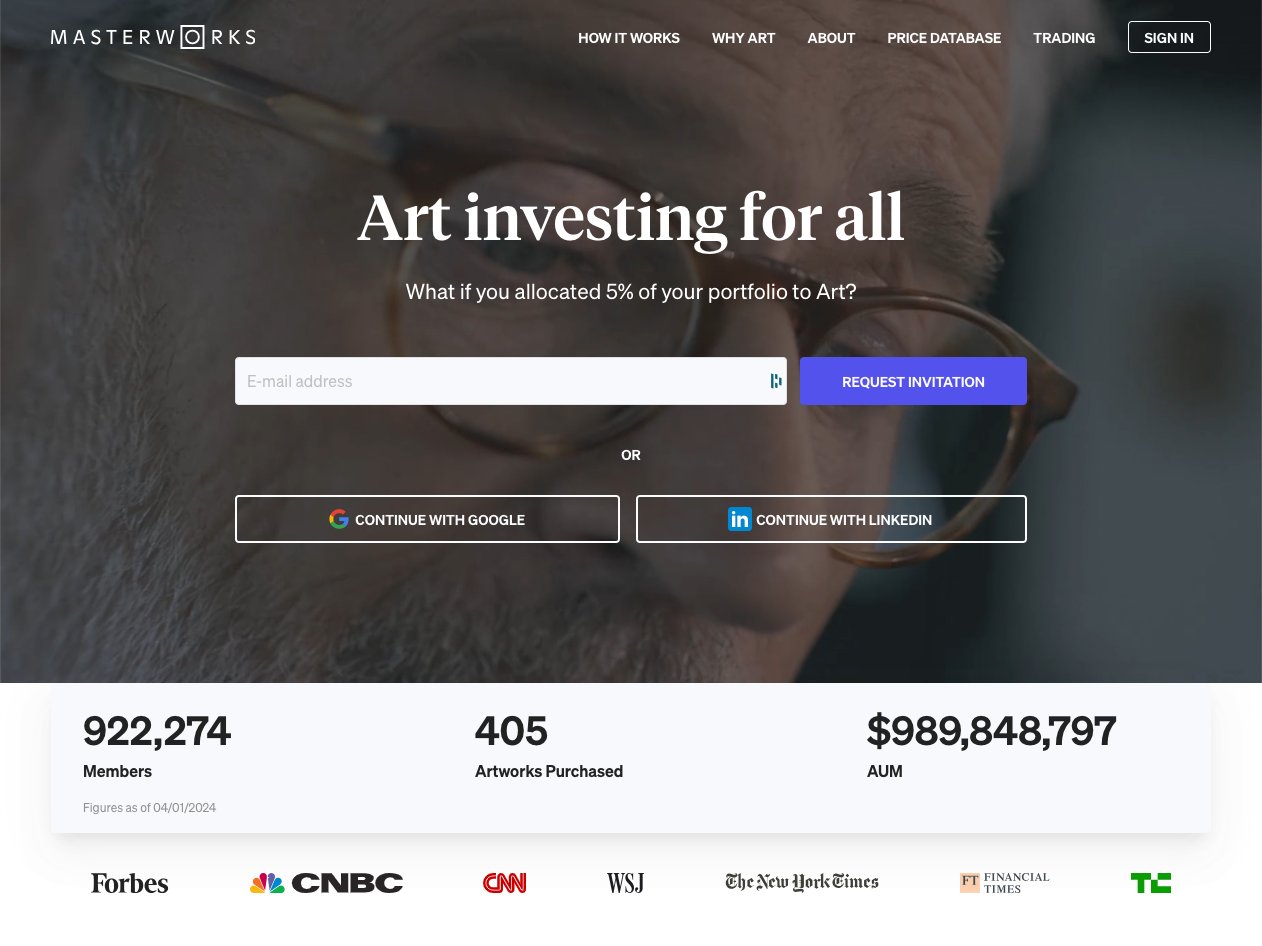
Masterworks is our selection for a wildcard investment tool. It’s an innovative platform that has opened the doors to one of the most exclusive investment markets available: fine art. Yes, like paintings.
Launched in 2017, the company offers an intriguing proposition—allowing everyday investors to buy shares in multi-million-dollar artworks by some of the world's most renowned artists, such as Banksy, Monet, and Warhol. This model not only democratizes access to a traditionally elite market but also provides a potentially lucrative alternative asset class that can diversify an investment portfolio away from traditional stocks and bonds.
The platform's key offerings revolve around its curated selection of blue-chip art, which is vetted by a team of art industry experts. Once acquired, these artworks are securitized with the Securities and Exchange Commission (SEC) and offered as fractional shares to investors. Masterworks takes care of all the logistics, from the acquisition and insurance to storage and eventual sale of the artwork. Investors can track the value of their shares and trade them on the Masterworks secondary market, adding a layer of liquidity to what is traditionally a very illiquid asset. This unique blend of art and finance makes Masterworks a compelling option for those looking to venture beyond conventional investment avenues.
Pricing:
- Annual management fee of 1.5%
- Commission of 20% of all profits from sales
Pros:
- Access to High-Value Art: Masterworks provides access to invest in multi-million-dollar artworks by renowned artists, which would typically be out of reach for the average investor.
- Potential for Diversification: Investing in art can serve as a hedge against market volatility since the art market often does not correlate directly with traditional equity and bond markets.
- Liquidity Through Secondary Market: Unlike traditional art investments, Masterworks offers a secondary market where shares of art can be bought and sold, providing a level of liquidity that is rare in the art world.
- Democratization of Art Investment: By offering fractional shares, Masterworks democratizes access to art investment, allowing more people to participate in this market.
- Expert Curation and Management: The company takes care of all aspects of art acquisition, insurance, storage, and sale, which removes the logistical challenges for individual investors.
Cons:
- Fees: Masterworks charges a 1.5% annual management fee and takes a 20% cut of any profits made from the sale of the artwork, which could diminish overall returns.
- Market Risk: The value of art can be highly subjective and unpredictable. The art market is influenced by trends, tastes, and economic factors that can fluctuate widely.
- Long Holding Periods: Art investments are typically long-term, often requiring several years before a work is sold at a profit. Investors should be prepared for a lack of immediate returns.
- Limited Control: Investors have no say in the management or sale timing of the artworks. Decisions are made by Masterworks based on market conditions and their expertise.
- Illiquidity: Despite the secondary market, selling shares can still be challenging if there is not enough demand. This can make exiting the investment more difficult than liquid assets like stocks.
Conclusion, Masterworks:
Investing with Masterworks can be an exciting option for those looking to diversify their portfolios with art. However, as with any investment, it's important to consider both the potential benefits and drawbacks, and how they align with your overall investment strategy and tolerance for risk.
While Masterworks is an intriguing option, we do not recommend using this servie if you’re just starting out, or if you don't already have a majority of your portfolio in more traditional asset classes - like stocks and bonds.
Overall Conclusion
In a financial world brimming with options, it’s crucial to choose tools that align perfectly with your investment goals and style. Our exploration of the top investment apps for personal finance aims to guide you through selecting the best fit for your financial journey. Whether you’re just starting out with apps like Robinhood and M1 Finance, looking for social trading dynamics with eToro, or seeking the comprehensive services of giants like Charles Schwab and E*TRADE, there’s a platform tailored to your needs. For those intrigued by alternative investments, Masterworks offers a unique opportunity to delve into the art market.
Each platform comes with its own set of pros and cons, but the overarching theme is clear: empowering you to make informed, strategic investment decisions. The right app can offer not only tools for growth but also the knowledge and support to navigate your investments wisely. As you consider these options, think about what matters most—cost, ease of use, range of services, or perhaps the community and educational resources. Your optimal choice should offer a balanced mix of these elements, helping you to not only build but also sustain and grow your wealth over time. Remember, the best investment app is the one that aligns seamlessly with your financial vision and goals.


